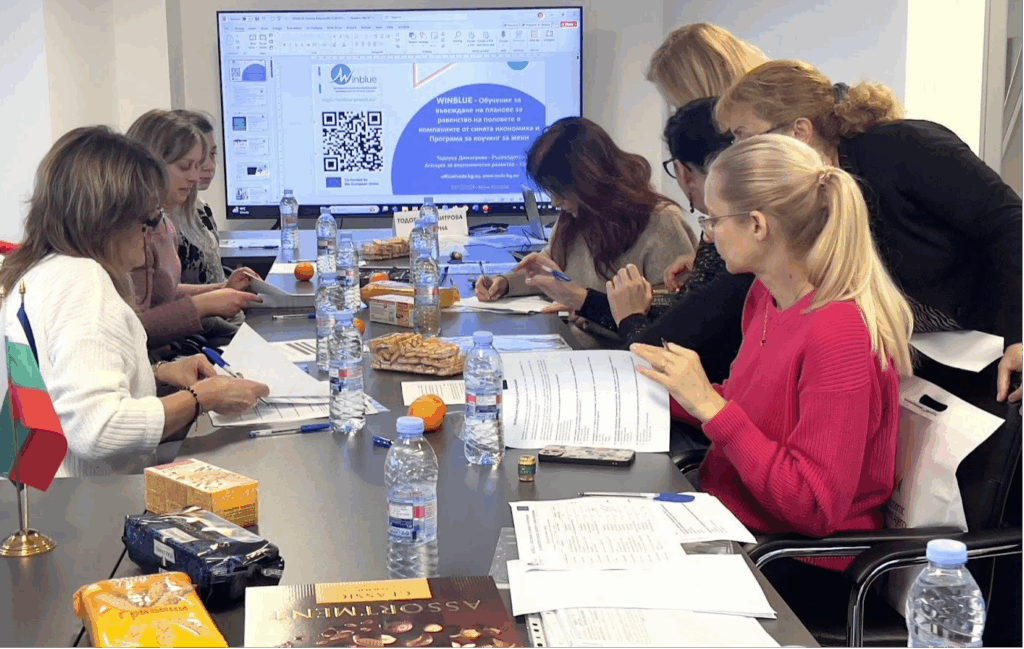
Last month marked the end of the two-year WINBLUE (Empowering Women and Mainstreaming Gender Equality in the Blue Economy) project, funded through the European Maritime, Fisheries and Aquaculture Fund (EMFAF).
Within the blue economy, the contribution and potential of women remains overlooked and undervalued, especially within roles related to STEM. A comprehensive study within the sector implemented within the WINBLUE project itself continued to confirm the existence of persistent gender barriers in the sector, including gendered stereotypes, conservative mindsets, lack of family support, undervalued skills, and unequal career opportunities. All combined, these barriers hamper employment and advancement for women in many of the blue economy’s male-dominated sectors.
To address this issue, the WINBLUE project took a multifaceted and multi-actor approach towards empowering women and reducing gender inequalities in the blue economy. AcrossLimits was a proud partner in this ambitious initiative coordinated by Italy’s largest public research institution, the Consiglio Nazionale delle Ricerche, alongside 12 other partner organisations from 7 countries.

AcrossLimits led the project’s third Workpackage, focused on delivering tangible and direct support to blue economy actors, using the data and good practices collected from the other Workpackages as a baseline. Using both a bottom-up and top-down approach, WP3 resulted in the development of the WINBLUE Resources Toolkit: a collection of adaptable tools at the disposal of blue economy stakeholders in their efforts to promote inclusivity and equality in their work. The Toolkit consists of 5 Gender Equality Plan Models for the 5 WINBLUE sectors, a gender equality Training Programme, and a Coaching Programme for women – all resources are available on our website in English, Italian, Spanish, French, Slovenian, and Bulgarian.
The WINBLUE Approach
The approach used in WINBLUE to develop the Toolkit acknowledges that two prongs of action are necessary when considering the issue of gender inequalities within blue economy organisations.
From a bottom-up perspective, WINBLUE focused on individual women working within the blue economy: entrepreneurs (or prospective entrepreneurs), researchers and academics working in the field who wish to progress in their career but are facing challenges. These barriers are both a result of the structural norms, biases, and attitudes perpetuated in a male-dominated workforce, but also the impact that this wider environment has on one’s own psyche and view of their own capacities. WINBLUE thus developed a 6 month, one-to-one coaching programme that was given to 30 women in the blue economy. The coaching programme recognises that empowerment is not a passive process but an active one that must also put the individual at the centre, thus providing agency. The coaching programme provided women with a dedicated space for reflection, goal-setting, soft skill development, and confidence-building, thus helping them identify and overcome personal and professional obstacles.
Coaching also has a ripple effect, and indeed the programme itself focused one of its sessions on the importance of building a network and “passing it forward”, in an effort to ensure that those who receive coaching seek to do the same for others. Indeed, so far 3 of our 30 coachees have already informed us of their plans to start providing this coaching programme to other women themselves!
Importantly, coaching women on its own is not the solution for gendered imbalances: an empowered individual still cannot overcome a structurally unequal system. Institutional-level change is still very much needed to overcome structural gender inequality, and that is why WINBLUE has also sought to target blue economy organisations. WINBLUE targeted top-down change in blue economy stakeholders by giving their leaders and management the tools they need to prompt change in organisational policy and actions.
The project achieved…
The creation of five Gender Equality Plan models: Gender Equality Plans are important policy tools at the hands of organisations, and provide a tailored way for each organisation to assess its current situation in terms of gender equality, develop targets and actions to address them, and monitor its progress. The WINBLUE GEP models provide an adaptable template that is tailored to the realities faced in each sector, ensuring that organisations understand what a GEP should include. Importantly, while GEPs are top-down in their implementation, the creation of the GEP models within the WINBLUE framework was bottom-up, as they were developed from a series of co-creation workshops directly with sectoral stakeholders across the 6 WINBLUE countries.

The creation and piloting of a Gender Equality Training Programme: Piloted with over 130 individuals across 6 training sessions in 6 countries, the aim of the WINBLUE training programme is to help foster workplace environments that acknowledge and understand the concept of gender (in)equality, and the importance of strong organisational policies and working cultures that advocate for inclusive policies. Training top-level individuals with the capacity to make a difference in their organisation (e.g. CEOs, HR managers, Training managers), the programme helps ensure that these individuals understand the issues at hand and their importance in a workplace context, and how to address them (including by using tools such as the GEP models and the coaching programme).



